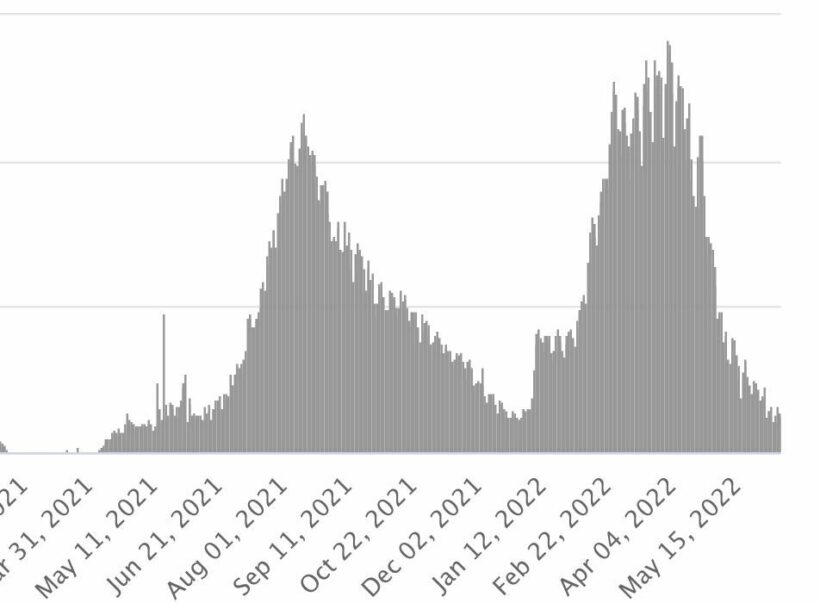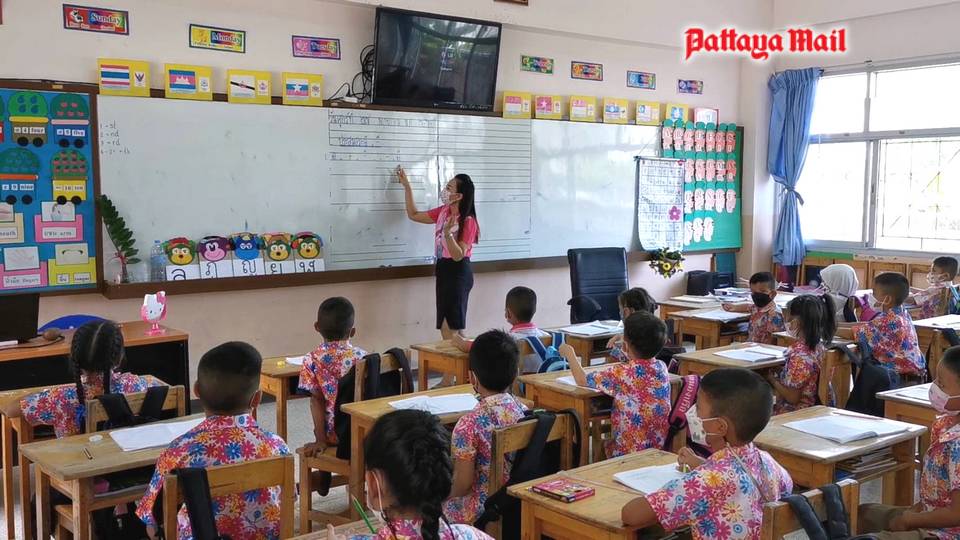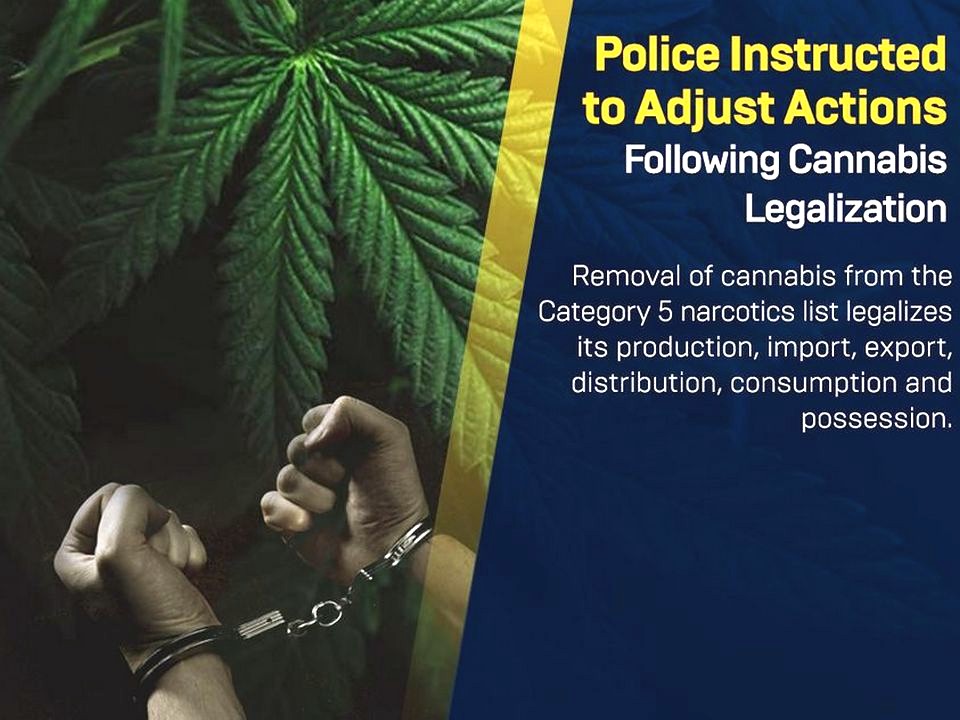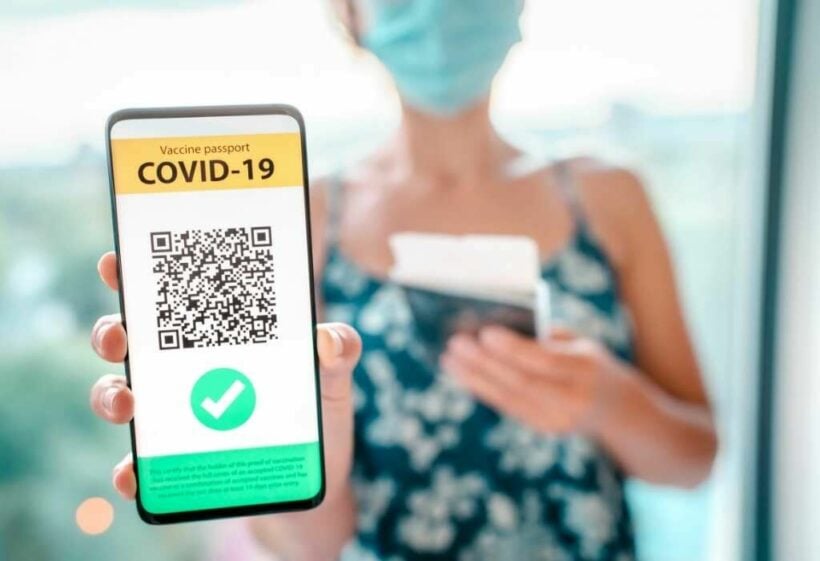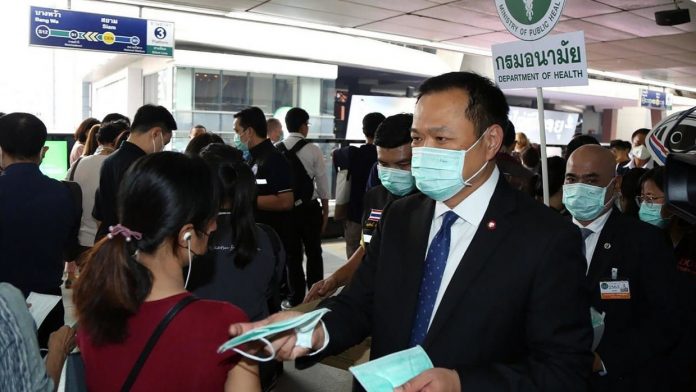Some analysts in the United States suggest that interest rates there could reach 2.7% to 3% by the end of 2022 leading to a wider divergence between interest rates stateside and in Thailand where even if the central bank does raise rates from August, most economists predict that they will only reach 1% by the end of the year, leaving a wider spread, thus encouraging capital flight and further depreciation of the baht.
There is rising concern that Thailand's economy may be caught between rising inflation on one hand which has seen consumer confidence plummet in May and an extended flight of capital out of the country which, despite indicators this week that the Bank of Thailand will begin raising interest rates in from August, may, in fact, be exacerbated further by a more hawkish Federal Reserve in the United States and a widening spread between Thai bank interest rates and not only those stateside but also those within Southeast Asia where countries such as Malaysia have higher rates. This could lead to further depreciation of the baht which has, so far this year, lost 15% of its value against the dollar.
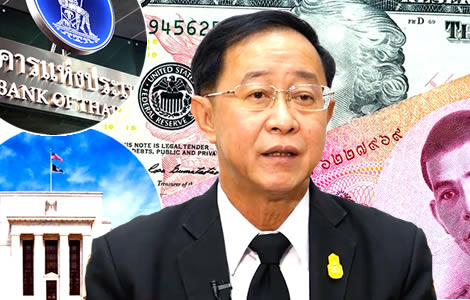
The Bank of Thailand at its Monetary Policy Committee meeting this week signalled strongly that it is moving towards a more hawkish monetary policy stance as the seven committee members voted 4-3 to maintain the historically low baseline interest rate at 0.5%.
It comes with comments, prior to the meeting, from the Prime Minister Prayut Chan ocha and the Minister of Finance Arkhom Termpittayapaisith, calling on the bank not to move precipitously with a rise in interest rates which could impede an ongoing but still very sluggish economic recovery but which is becoming a necessity also to contain inflation which reached a 14 year high in May when it hit 7.1%.
Finance Minister, before Wednesday's meeting, on Monday, encouraged the central bank to preserve a low-interest-rate environment to spur recovery
The Finance Minister Mr Arkhom was unequivocal on Monday when he said that the central bank, whose primary mission is to preserve financial stability, should aim for a low-interest-rate environment while the recovery is still gaining traction against headwinds thrown at it by external factors, particularly the Russian Ukraine war.
In its statement after the meeting, the Bank of Thailand indicated the anticipated return of Thailand's key foreign tourism industry at critically high volumes later in the year, may allow it to move on interest rate hikes to begin taming inflation.
Only 1.1 million visitors in the first four months of 2022 with some fears the economy could slide backwards in Qtr 2 with slower export growth
There are also real fears that the economy may contract in the second quarter of 2022 which emphasises the lacklustre nature of the current recovery which is increasingly dependent on a buoyant performance in the second half of the year.
Rising inflation this year in Thailand which one bank, this week, projected to be 6.6% at the end of the year with a tapering off in the last quarter, is certain to wipe out any potential GDP gain the country may stand to achieve in 2022.
At Wednesday's meeting, the committee suggested that the Thai economy should grow at a rate of approximately 3.3% this year based on a strong and growing performance from the foreign tourism sector even as manufacturing and export growth which accounts for 65% of the Thai economy, is stalling.
Export growth impeded by deteriorating conditions within the world economy and ongoing Ukraine war
This is being caused by geopolitical instability and plunging economic growth rates worldwide but is also being exacerbated by strict Chinese pandemic lockdown measures and a wipeout of Thai exports to Russia which plunged by nearly 80% in March and April according to Mr Kittinan Yingcharoen, the boss of the Office of Overseas Trade Promotion stationed in Moscow.
Thailand's automobile exports to Russia have all but been wiped out with a 97.59% contraction rate.
Analysts such as Nomura Bank and Goldman Sachs are strongly predicting that from August this year, the Bank of Thailand will begin to raise interest rates with Goldman Sachs predicting a significant rise of 200 basis points by the third quarter of 2023 while other institutions and economists are predicting that interests rates will have risen to 1% by the end of 2022.
Lowest consumer confidence level in nine months
On Thursday, the University of the Thai Chamber of Commerce announced that the Thai Consumer Index had again fallen to a ninth-month low in May as ordinary people grappled with rising prices including higher energy and food costs.
The index fell from 40.7 in April to 40.2 in May.
Thailand is caught between a deteriorating world economy, rising interest rates in the United States and a surge in oil prices which the government is trying to alleviate with an increasingly limited and constrained budget.
Currently, the baht is trading at ฿34.50 to the US dollar showing a 15% fall from the end of 2021 and even though interest rates are expected to rise in August when the Monetary Policy Committee next meets.
Hawkish Federal Reserve has plans to aggressively tackle US inflation in the months ahead which will directly impact Thailand's liquidity and the baht
There is concern that the Federal Reserve in the United States may continue to raise interest rates as it has signalled an aggressive intent to tackle inflation in America which is rising at a higher rate than in Thailand.
The current consensus among economists is that Thailand will have an interest rate of 1% by the end of the year while the United States which currently has an interest rate of 0.75% to 1%, is forecasted to rise to between 2.75% to 3% by the end of 2022.
Interest rate hikes of 50 basis points each expected this month and in July with another in September
Malaysia's central bank raised its interest rate in mid-May bringing rates there to 2% compared to Thailand's rate of 0.5%.
This may spell trouble for Thailand, the value of the baht and hence inflation, caused by an increased impetus towards capital flight westwards which has also created an extremely tight liquidity situation throughout the financial system and Thai economy.
In order to stop the flight of capital out of Thailand, interest rates in the kingdom should ideally be slightly higher than those in the United States as traditionally has been the case.
Thailand is protected by an unusually high level of foreign exchange reserves which at the beginning of May stood at $228 billion.
The world has already seen the potential for catastrophe caused by foreign capital flight and a shortage of foreign exchange reserves in recent months in Sri Lanka and Nepal and even in Turkey where a determination not to raise interest rates by the government of President Recep Tayyip Erdoğan, described by many analysts as 'misguided', has seen the lira lose 79% of its value over the last five years with inflation in May reaching 73.5% with an economy suffering sluggish growth.
Rising rates with chronic household debt levels
It is clear that an urgent adjustment of the country's monetary policy is needed given the inflationary pressures generated by the war in Ukraine and the increasingly hawkish monetary policy in the United States.
Thailand's economy is still well below GDP levels seen in 2019 and is showing signs of weakness compared to its peers in Southeast Asia as it struggles to make a recovery.
Crisis greater than the Financial Crisis of 1997 with household and private sector debt at worrying levels
Many analysts are less concerned about the negative impact of higher borrowing costs on an economy which is highly leveraged with record levels of household debt than the impact of the continued flight of capital out of the country first noticed in August 2021.
Unbalanced economy with 70% of Thailand's workers only accounting for 1% of country's export industry
A key problem for Thailand since its economy, already laden with chronic internal problems, but which also began to be challenged by external factors, first in 2019 with the growth of US-Chinese tensions and then the COVID-19 crisis, has been its unbalanced nature.
Finance Minister Arkhom Termpittayapaisith is said to be extremely concerned about a potential for interest rate hikes of 2% over the next year on large Thai manufacturers and exporters with fears that rising borrowing costs will impede investment and, in turn, lead to firms losing competitiveness and profitability.
On the other hand, the flight of capital out of Thailand has, since the end of last year, seen a tightening of liquidity which is impacting smaller firms and making it difficult for them to borrow while also impacting local consumers who are the lifeblood of such concerns.
Thailand has 3.1 million small enterprises which only contribute to 1% of Thailand's exports but which, at the same time, employ 12 million people or 70% of the 17 million people who are legally recorded as employed in the country.
A combination of heightened liquidity and higher inflation is eroding confidence and domestic consumer spending.
Rebound expected in foreign tourism numbers is the key hope for Thailand's economic growth prospects
Thai planners can only hope for a stronger than expected rebound in foreign tourism, a continued ability of Thai exporters to find markets and some resolution to the inflationary pressure due to the war in Ukraine driving up the price of oil and the cost of food.
One Bangkok-based economist, Mr Pipat Luengnaruemitchai, of Kiatnakin Phatra Financial Group has warned that heightened inflation is not only wiping out the purchasing power of consumers but also leading to rising costs for the country's export concerns and thwarting private investment plans.
Thailand, while a net exporter of food, is also very dependent on foodstuff imports as well as oil, with the rising costs of crude impacting its current account while the rising price of external foodstuffs is also driving inflation.
'Even though Thailand is a food exporting country, the country has a very high proportion of energy and food consumption in the consumer basket compared with other countries,' Mr Pipat pointed out. 'The effect from inflation on the population may be greater, especially on low-income people that consume higher amounts of food and energy than rich people.'

